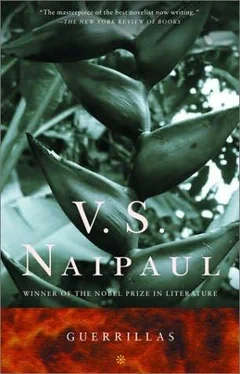V. Naipaul - Guerrillas
Здесь есть возможность читать онлайн «V. Naipaul - Guerrillas» весь текст электронной книги совершенно бесплатно (целиком полную версию без сокращений). В некоторых случаях можно слушать аудио, скачать через торрент в формате fb2 и присутствует краткое содержание. Год выпуска: 1990, ISBN: 1990, Издательство: Vintage, Жанр: Современная проза, на английском языке. Описание произведения, (предисловие) а так же отзывы посетителей доступны на портале библиотеки ЛибКат.
- Название:Guerrillas
- Автор:
- Издательство:Vintage
- Жанр:
- Год:1990
- ISBN:978-0679731740
- Рейтинг книги:5 / 5. Голосов: 1
-
Избранное:Добавить в избранное
- Отзывы:
-
Ваша оценка:
- 100
- 1
- 2
- 3
- 4
- 5
Guerrillas: краткое содержание, описание и аннотация
Предлагаем к чтению аннотацию, описание, краткое содержание или предисловие (зависит от того, что написал сам автор книги «Guerrillas»). Если вы не нашли необходимую информацию о книге — напишите в комментариях, мы постараемся отыскать её.
Guerrillas — читать онлайн бесплатно полную книгу (весь текст) целиком
Ниже представлен текст книги, разбитый по страницам. Система сохранения места последней прочитанной страницы, позволяет с удобством читать онлайн бесплатно книгу «Guerrillas», без необходимости каждый раз заново искать на чём Вы остановились. Поставьте закладку, и сможете в любой момент перейти на страницу, на которой закончили чтение.
Интервал:
Закладка:
They had come out into the back yard of the Grange: no shade, the bush laid waste, the land sterile. The main building blocked a view of the road and of the fields beyond the road. The corrugated-iron roof glittered; the concrete-block walls were in shadow. A roll of wire netting, old scantlings, a junked metal icebox, white enamel basins: this was part of the debris at the back. A low lean- to shelter, its palm thatch sloping down almost to the ground, was fixed to the back wall; below the thatch there was black shadow. Scattered about the ground were back yard structures and relics of back yard projects: a wire-netting pen, torn in places; chicken coops of wire netting and old board; a dry pit, the dug-out earth heaped up on one side beside a load of concrete blocks.
There was a boy in the shadow of the lean-to. He was sitting on the ground in the angle of the thatch and the ground. His knees were drawn up, and his head and arms rested on his knees. He seemed asleep. His white canvas shoes were yellow with dust; his washed-out jeans were dusty; his elbows were scratched and there was dust on his black arms.
“You remember Bryant?”
Jane said, “I don’t remember him.”
“He remembers you.”
The boy raised his head. His face was twisted and he wore the pigtails of aggression. His eyes were red and blurred, one lid half stuck down. He stood up. He ran back into the lean-to, and when he turned to face them he had a cutlass in his hand and he was in tears.
He cried, “Jimmy! Jimmy!”
Jimmy locked his right arm about Jane’s neck and almost lifted her in front of him, pulling back the corners of his mouth with the effort, and slightly puffing out his shaved cheeks, so that he seemed to smile.
He said, “Bryant, the rat! Kill the rat!”
Bryant, running, faltered.
“Your rat, Bryant! Your rat!”
Her right hand was on the arm swelling around her neck, and it was on her right arm that Bryant made the first cut.
The first cut: the rest would follow.
Sharp steel met flesh. Skin parted, flesh showed below the skin, for an instant mottled white, and then all was blinding, disfiguring blood, and Bryant could only cut at what had already been cut.
He cried out, in tears, in pain, in despair, “Help me, Jimmy!”
Jimmy, responding, tightened his grip around the neck. He scarcely felt the neck; he felt only his own strength, the smoothness of his own skin, the tension of his own muscles. He concentrated on that smoothness and tension until she began to fail. She grew heavy; his strength became useless; and as he felt her fail a desolation began to grow on him. And then there was nothing except desolation.
He was squatting on the ground, beside the dry pit of the septic tank and the heap of dug-out earth, looking at the earth and not the face, and not seeing the earth. He saw a day of sun at the beach, sea and sky bright beyond the coconut grove, the girl bleeding on the fender of the car, accepting water from his cupped hands, and love coming to her frightened eyes. But the eyes below him were closed. They knew nothing; they acknowledged nothing; they had taken away everything with them. He entered a void; he disappeared in that void.
Then he was lost, lost since the beginning of time. But time had no beginning. And he was disembodied. He was nothing more than this sense of loss that grew deeper and deeper as he awakened to it; he would have liked to scream, for the relief. The world cleared up, time defined itself. He was himself, in a stone room, full of incense, with stone coffins on stone shelves, where dead women lay without being dead among white lilies. A woman sat up in her stone coffin; the lilies tumbled off her. She was Sudanese, like those he had seen in London: he could tell from her fine white cotton dress, her pallid brown skin and the healed slashes on her cheeks. She had the wanton face, the leer, the degraded mouth of a French prostitute he had seen in a pornographic photograph at school, sitting clothed but with her skirt pulled up, her legs open, her great hairiness exposed. She sat up in her roughly chiseled coffin, leering, the lilies falling off her, and she said, holding out her hand, “Nigger, give me a dollar.”
So that even here, though he had been lost since the beginning of time, though he was lost in time itself, and didn’t know who or what he was, he was betrayed, his secret known.
The secret recalled him to himself, and his desolation was complete. He was squatting beside the girl on the edge of the dry pit, its crumbling walls still carrying fork marks, and Bryant, the cutlass in his hand, was crying, like a man who at any moment was going to scream.
“Jimmy, Jimmy.”
He stood up and held Bryant by the arm. He said, “Bryant!”
“Jimmy, Jimmy.”
“In here, Bryant.”
“In the latrine, Jimmy.”
“No. The corbeaux will come.”
And Bryant looked up with Jimmy at the pale sky.
They put her in the pit, with her dead hair, still loose where it was not stained and stiff, with her necklaces, her open bag. The heaped-up earth beside the pit, dug out weeks before, had settled and seemed hard; but it broke up and crumbled at a touch, red-brown below the straw-colored, powdery crust. At first with their hands and feet alone, then with concrete blocks, then with a spade, they broke up the earth and shoveled it in, until there was nothing to be seen; and there remained only dust and labor, burning faces and arms, sweat and the stinging sun.
Far away, from the road, it seemed, there came the sound of whistling. No recognizable tune, and it stopped almost as soon as they heard it.
They looked up at the sky: it was empty.
Then the whistling came again, closer. Bryant looked at Jimmy. Jimmy said, “Bryant.” Bryant ran for his cutlass. Jimmy said, “Bryant!” And this time Bryant obeyed. He began to do what he saw Jimmy doing: rubbing clods of red-brown earth on his trousers and shirt. Jimmy undid the buttons of his Mao shirt, and the two men, Bryant with his cutlass, walked to the back door of the main building, into sudden shade.
A young man was coming up to the building from the road. He was small, his blue shirt slack and bulging above his tight striped brown trousers. He was wearing white-rimmed shades; his shoes, too tight for him, gave him a dainty walk; a white airlines bag hung from his shoulder.
Bryant said, “Mannie.”
Jimmy said, “Nowhere to go. They’ll start coming back. All of them. But it’s too late.”
“Jimmy, Jimmy.”
“It’s too late for them now.”
“Let me take him out, Jimmy. Let me take him out!”
Jimmy didn’t reply. He went into the building and walked halfway down between the empty beds. Bryant remained in the back doorway.
Mannie came in out of the sun. He took off his white-rimmed shades: his nose was shining and there was sweat all over his face. He looked at Jimmy and said shyly, “Mr. Ahmed,” and looked down. His small black shoes were extravagantly pointed; the points tilted up, the heels were worn. He went to his old bed and sat on the edge of the bare mattress, with his back to Jimmy and Bryant. He opened the airlines bag and began taking out small green tomatoes and laying them on the concrete floor.
Bryant said from the back doorway, “Let me take him out, Jimmy.”
Mannie didn’t turn.
Jimmy sat on one of the empty beds and said, “Mannie.”
Mannie turned. “Yes, Mr. Ahmed?”
“You come back?”
“I walk down from the highway, Mr. Ahmed.”
“That’s a long walk for a hot day. We’ve been working.”
“Mr. Ahmed.”
“And now you come back. And you start picking my tomatoes.”
Mannie’s face went small and closed. Little beads of sweat began to grow on his shiny nose.
Читать дальшеИнтервал:
Закладка:
Похожие книги на «Guerrillas»
Представляем Вашему вниманию похожие книги на «Guerrillas» списком для выбора. Мы отобрали схожую по названию и смыслу литературу в надежде предоставить читателям больше вариантов отыскать новые, интересные, ещё непрочитанные произведения.
Обсуждение, отзывы о книге «Guerrillas» и просто собственные мнения читателей. Оставьте ваши комментарии, напишите, что Вы думаете о произведении, его смысле или главных героях. Укажите что конкретно понравилось, а что нет, и почему Вы так считаете.












